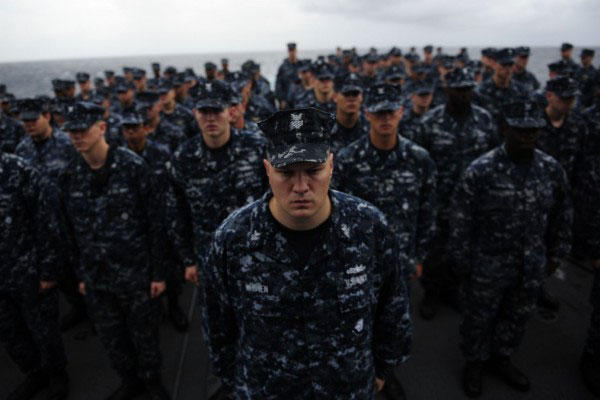A U.S. Navy retention survey found that sailors are increasingly unhappy with lengthy deployments, a high operational tempo, and recent calls to reduce pay and benefits.
In addition, fewer numbers of Navy sailors aspire to earn positions held by their superior officers as sailors have a widespread distrust of Navy leadership, the independent survey found.
"Sailors are most likely to leave uniformed service because of a perception of increasingly high operational tempo, poor work/life balance, low service-wide morale, declining pay and compensation, waning desire to hold senior leadership positions, and a widespread distrust of senior leadership, all of which erodes loyalty to the institution," the survey states.
The survey asked sailors about their jobs, quality of life and senior leadership issues. Overall, 5,536 sailors responded to the survey. The respondent pool was almost half officers and half enlisted sailors.
When it comes to the issue of operational tempo, survey respondents seemed to indicate that they expected deployment times to increase. According to the results, 42 percent of sailors who responded said their last deployment was between seven and nine months in length.
About 48 percent of sailors expected their next deployment to be between eight and ten months. These estimates are significantly higher than the 6 month average deployment length the Navy has laid out.
Sailors spoke negatively about work-life balance as well, with 62 percent of sailors saying they believe their work-life balance is not ideal. Only 21 percent of sailors said their work-life balance is ideal.
The survey found sailor morale to be a problem, finding only 18 percent of sailors consider morale to be excellent or good. Comparatively, 42 percent of survey respondents said morale is "marginal" or "poor."
Respondents also had a problem with ongoing discussions to reduce sailor pay and benefits, the survey found. As many as 80 percent rank the current retirement system and 74 percent rank pay and compensation as two of the most important reasons to remain in uniform.
About 63 percent of respondents said they believe it would be easy to get hired if they left the Navy.
What was striking to survey officials was how few sailors strived to earn more senior positions in the Navy. Nearly 50 percent of survey respondents said they did not want their boss' job.
"The comments indicate an increasing belief that positions of senior leadership, specifically operational command, is less desirable because of increasing risk aversion, high administrative burden and, in some cases, a pay inversion where commanding officers are paid up to 10-percent less than the mid-career officers they lead," the survey states.
Survey authors regard widespread distrust of senior leadership as among their most troubling findings.
"37.2 percent regard senior leadership as 'marginal' or 'poor,' a plurality state they do not trust senior leaders, 51.3-percent don't believe senior leaders care what they think and 50.1 percent of sailors do not believe senior leaders hold themselves accountable," according to the survey.
Navy officials told Military.com that the service welcomes the findings of the study and that the service will carefully weigh the results alongside other indicators.
"It is clear from their work that the team has a passion to make our Navy better. Along with our own surveys and the direct feedback we get from social media and all hands calls, this information is another data point that will help us make better decisions for our sailors and their families," Navy spokesman Cmdr. Christopher Servello told Military.com.
In addition, Servello said the Navy is working on a handful of key initiatives designed to address many of the issues raised by the survey.
"Based on our initial looks, we are encouraged, as there appears to be good intersections between the survey data and initiatives already underway. Returning authorities to commanding officers, compensating our sailors for longer deployments and reducing administrative burdens are all efforts in work that will help further increase trust, balance and stability across the fleet," Servello added.
-- Kris Osborn can be reached at Kris.Osborn@monster.com.





















